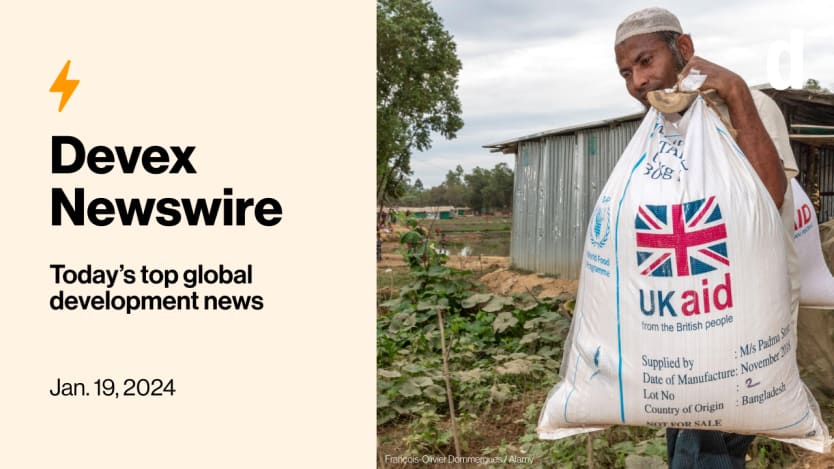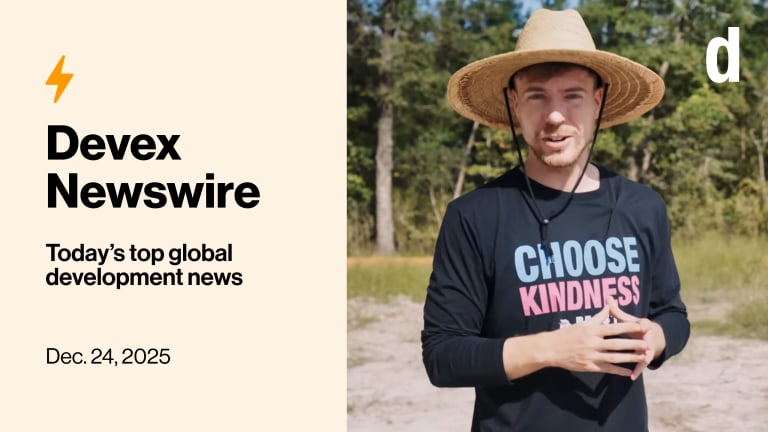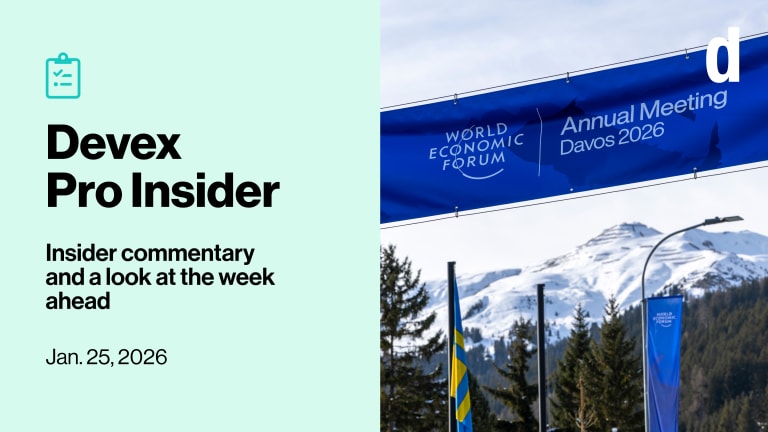
A little-known “star chamber” set up by U.K. international development minister Andrew Mitchell to tackle chaotic dishing out of official development assistance is bearing fruit.
Also in today’s edition: We look at climate-resilient seeds in Syria, Argentina’s Javier Milei makes his mark at Davos, and Women Deliver apologizes for the Hungarian president’s anti-abortion stance.
UK ‘star chamber’ bolsters aid
After many long months of seemingly similar stories revealing devastating cuts, cuts, and more cuts to U.K. aid, we finally have a change in direction and a big increase in spending overseas.
This is a preview of Newswire
Sign up to this newsletter for an inside look at the biggest stories in global development, in your inbox daily.
About a year ago, Andrew Mitchell — then-newly installed international development minister — set up what he dubbed a “star chamber” to get a grip on chaotic allocations of official development assistance, or ODA. Today, there is some evidence that order is being restored, writes our U.K. Correspondent Rob Merrick.
Spending is now rising sharply at the Foreign, Commonwealth & Development Office, enabling a £1 billion ($1.27 billion) humanitarian relief pot and a £150 million “resilience and adaptation” fund to help low-income nations tackle climate disasters. At the same time, it’s falling at domestic departments which were grabbing more and more of a shrinking ODA pot.
The numbers suggest FCDO is stemming the bleeding from cuts that wrecked aid programs and brought international criticism — even as the promise to quickly restore aid spending to 0.7% of gross national income has not been fulfilled.
The idea behind the so-called star chamber — apparently a beloved phrase for British politicians because of its historic association with King Henry VIII — was to prevent the Home Office from siphoning funds for overseas aid programs to use for its huge backlog of asylum-seekers in the United Kingdom.
With refugees and asylum-seekers gobbling up a staggering £3.7 billion in 2022, or 29% of the total, more international aid was spent at home than overseas.
“We now have the budget under better control thanks to the work of the committee and the appointment of the second permanent secretary [Nick Dyer],” Mitchell tells Rob. “This will support us to reach our development goals of tackling humanitarian and climate change priorities, and supporting the world’s most vulnerable people.”
Read more: Why UK aid spending is finally rising after years of painful cuts (Pro)
+ A Devex Pro membership lets you get the most out of our U.K. aid sector coverage. Not yet a Pro member? Start your 15-day free trial to access all our exclusive reporting and analysis as well as events and career resources.
Further amends
Many were shocked when Hungarian President Katalin Novák took the stage during the opening ceremony of the Women Deliver conference in Kigali, Rwanda, last July and spoke about the dangers of dropping birth rates.
The event is one of the largest global conferences to advance gender equality and one attendee told my colleague Sara Jerving that “Novak stands against everything the women’s rights movement represents” with her opposition to abortion and her partnership with “the most extreme elements of several anti-rights networks.”
In response, Women Deliver said decisions around the roster for the opening ceremony were led by the host nation, Rwanda, and that their organization is in “no way aligned” with her views.
The organization reiterated that point this week when it released its post-conference assessment noting that “the criticism we received due to the presence of Hungarian President Novak was warranted, and we apologize for our failure to prevent this from happening.”
ICYMI: Feminists descend on Kigali for Women Deliver
Milei slams 2030 ‘Marxist’ agenda at Davos
Another anti-abortionist made waves this week. At Davos, Argentina’s new libertarian President Javier Milei made his debut on the world stage before the global elite at the World Economic Forum annual meeting, slamming socialism and state intervention as the mother of all evils and praising free-market capitalism.
A fierce critic of the 2030 “Marxist” agenda that set the Sustainable Development Goals, he hailed corporates and entrepreneurs as heroes, while calling those living off the state “parasites.”
Unlike many world leaders who parked their private jets on the tarmac around Davos, Milei arrived on a commercial flight, chatting with passengers in the aisle and promising to "plant ideas of freedom in a forum contaminated by the 2030 socialist agenda, which will only bring misery to the world."
“I’m here to tell you that the Western world is in danger and it’s in danger because those who are supposed to defend the values of the West are being co-opted by a vision of the world that inexorably leads to socialism, and so, to poverty,” the shaggy-haired Milei told the Davos audience.
His address lit up X, formerly Twitter, pushing him into the global top 20 of trending hashtags. And while his message must have been music to the ears of some of the well-heeled capitalists in the room, others may have found it tone-deaf given the forum's attempts to address poverty and achieve the SDGs. Meanwhile, he was lauded as a bit of a rock star, with International Monetary Fund chief Kristalina Georgieva even getting a selfie with him after their meeting.
It remains to be seen whether Milei — known for brandishing a chainsaw which symbolizes his vow to slash state spending — will see his speech fall on deaf ears globally or be taken up as a refreshing stance. But his message certainly set a new tone in the echo chamber at Davos.
+ Get more insider reports, tidbits, and analysis from Davos with Davos Dispatch, a selection of special episodes focusing on the summit for our This Week in Global Development podcast. Subscribe to get updated on new episodes.
Seeing is believing
Every year at Davos, there's a vast and eclectic range of panels, and our senior correspondent Vince Chadwick says his personal favorite this time was "Does Finance Benefit People?" I have a hunch he was being sarcastic.
In any event, Vince tells me that a tonic to all the talk was an experience he had when being led through the latest global health innovations from the Bill & Melinda Gates Foundation. He actually said it gave him “goosebumps” to see the technologies that could save millions of lives.
Watch as Trevor Mundel, president of the foundation's global health program, demonstrates a simplified oral test for tuberculosis, a painless patch of microneedles that delivers vaccines, and a new generation of ultra-thin tests for diagnosing the likes of malaria and COVID-19, which can be printed in their millions daily.
+Listen: Devex President & Editor-in-Chief Raj Kumar, Hedera Chief Policy Officer Nilmini Rubin, and BRAC Executive Director Asif Saleh discuss some of their key takeaways from Davos in the latest episode of our weekly podcast series.
Spotted at Davos
Half the fun of these events is people-watching — some may have you Googling, but others are high profile enough to compete with Milei for selfies. At the Humanitarian Happy Hour co-hosted by Devex, Raj emceed alongside the International Rescue Committee's David Miliband, climate champion Hindou Ibrahim, and Circle's Dante Disparte.
And milling around the event were the United Nations refugee agency’s Kelly Clements and Carmen Hett, Habitat for Humanity's Jonathan Reckford, CEPI's Richard Hatchett, Sanitation and Hygiene Fund's Dominic O'Neill, Accenture Development Partnerships' Louise James, ODI's Sara Pantuliano, MSD's Julia Spencer, ATscale's Pascal Bijleveld, Street Child's Tom Dannatt, green investor Rushank Bardolia, World Food Programme's Bernhard Kowatsch, and many more.
Sowing the seeds in Syria
Almost 14 years of conflict and devastating climate change have ravaged the land in Syria, creating an increasingly difficult place for farmers to cultivate. It’s taken a particular toll on seeds.
So improving seed quality is key. A pilot project to boost access to high-quality, climate-resilient seeds offers some hope, though, and the positive effects could reach far beyond farmers, writes Helen Morgan for Devex.
Half of the crops in the Al-Hasakah governorate — once Syria’s breadbasket — could die because of droughts, according to the U.N. And with water levels of the Euphrates River dropping, crop yields are further at risk.
Farmers are vulnerable and depend on subpar seeds that degenerate over time. One way to reduce vulnerability is through climate-smart agriculture such as resilient seeds, or seeds bred to withstand harsh conditions and disease.
Tara Clerkin, climate resilience lead at IRC, tells Helen that the humanitarian organization saw an opportunity and in 2022 began a seed resilience project — the Seed Security Solution Package — as a pilot in the Kurdish-led Autonomous Administration of North and East Syria. The difference has been marked.
Read: Climate-resilient seeds offer farmers in Syria a path to food security
In other news
Attacks by Iran-backed Houthis from Yemen on commercial vessels passing through the Red Sea have caused a slowdown in Ukrainian farm exports, according to agriculture minister Mykola Solskyi. [Reuters]
The German Parliament passed a bill that will allow faster deportations of rejected asylum-seekers to address irregular migration and related issues. [DW]
A new United Nations report highlighted that Afghanistan’s economic recovery relies on restoring women’s rights and international support for boosting productivity. [UN News]
Sign up to Newswire for an inside look at the biggest stories in global development.








